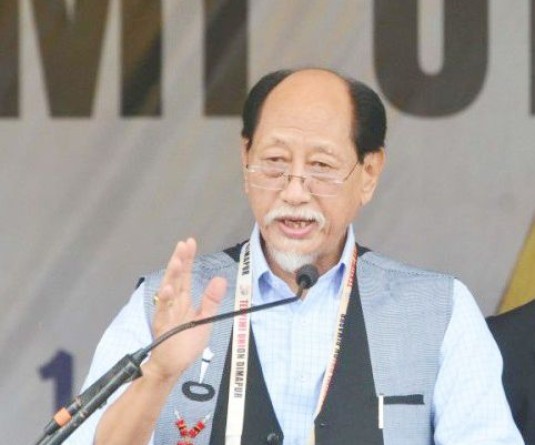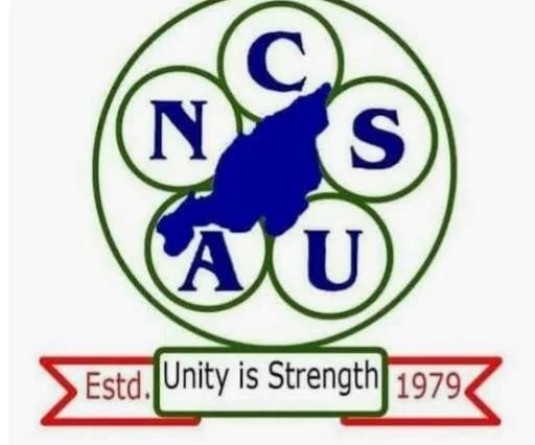
Morung Express News
Patkai | August 10
From the intricate interplay of humans and forests to the rich but intricate tapestry of cultures and the burgeoning realm of artificial intelligence (AI), Patkai Christian College (Autonomous) Golden Jubilee Lecture on August 10 delved into the complex issues shaping the world today.
Capturing the contemporary zeitgeist, the lecture explored three seemingly disparate yet interconnected themes: “Abundance: Living with a Forest,” “Multiculturalism, Values, and Solidarity: Education and Coming-of-Age in Northeast India,” and “AI in Action: From Canvas to Commerce to Cosmos.”
The center piece of noted Naga anthropologist and Patkai alumna, Dolly Kikon’s presentation was the screening of her documentary, “Abundance: Living with a Forest (2024),” a poignant exploration of foraging, forest life, and jhum cultivation in Nagaland.
She explained that approximately 60% of Nagaland's population depends on jhum cultivation and it had been recognised as a significant component of Indigenous knowledge systems in recent years.
Foraging is a community practice where traditional knowledge and history of the land are passed down, both are intrinsically linked to the forest, noted Kikon, currently a professor in the Department of Anthropology and the Director of the Centre for South Asian Studies at the University of California, Santa Cruz.
However, she also underscored the challenges posed by rapid development with activities such as plantation, monocropping, mining, and infrastructure development severing the vital connection between people and the land.
‘Living with’ a Forest follows Zareno, a Lotha forager in the forest of Khumtsü and is described as an invitation to reflect connections with land, community, and other beings as well as highlights an impending loss that Indigenous communities encounter across the world.
Kikon, meanwhile, urged for creating stronger and more vibrant communities that reflect “our true selves by embracing our unique heritage and applying the hard-earned wisdom of our forefathers.”
Inclusivity and solidarity
Sanjay (Xonzoi) Barbora, Associate Professor, Department of Sociology, University of California, Santa Cruz explored “Multiculturalism, Values, and Solidarity: Education and Coming-of-Age in Northeast India” by examining how values are formed and sustained in a multicultural context and role of educational institutions in shaping values and fostering solidarity in such society.
Initially, he delved into the significance of the college's name and explained that “Patkai” in the Tai-Ahom language refers to a place where a sacred chicken was sacrificed.
“Such rites of passage are common in most human societies. Some may have origins in ancient times but have survived into our age. They help build values in individuals and communities that can be passed on from generation to generation,” he explained.
In this context, he posited: How have institutions nurtured values that have helped create a better society in the NE region? What are these values? And how does one address the conflicting responses that challenge our coexistence on this planet?
On the question of multiculturalism, a contentious issue in recent times, he wondered whether every individual picks up the same societal codes and values in a multicultural context.
Barbora also noted that the NE’s linguistic and cultural diversity has been under pressure since the late nineteenth and early twentieth centuries but negated the argument of “ultra-nationalists” to blame migration for such development.
Whether temporary or permanent, “migration leaves us more prosperous in learning new languages and cultures,” he added.
Thus, he argued that the modernist idea that only “one language can propel us to prosperity is destructive and damaging” and it quickly “creates hierarchies and a power structure, where some languages are considered more important than others.”
Barbora treatise on multiculturalism was anchored on the idea of inclusivity reflecting a recognition of the diverse cultural backgrounds. “When we do not understand our neighbours' language, we are prone to making assumptions about them, which can lead to more significant conflicts,” Barbora highlighted.
Role of Institutions
To this end, Barbora located the critical role of institutions in nurturing an environment of multiculturalism built through the imparting of values.
However, he noted that encouraging revolutionary ideas for institutions are often challenging, as most prefer stability and order, almost tilting towards the status quo.
“Most institutions encourage some degree of multiculturalism, even though we are going backwards on this count in India,” he asserted.
Barbora acknowledged that institutions cannot openly advocate for the overthrow of oppressive systems because they provide a safe space for diverse thinking. As graduates enter the world, they become industry leaders or entrepreneurs who confront inequality and injustice. Thus, institutions serve as safe havens for differing experiences and intentions.
AI Frontier
Dwelling on “AI in Action: From Canvas to Commerce to Cosmos,” Hamish D'Souza, Data Science Engineer, Pier Sight Space, narrated how human invention from fire to wheel to electricity to computer has revolutionised the global progress.
AI, which first evolved in early 1940s, is one such development, he noted, taking the students to its historical development, models and application in various fields.
Further, he also examined various apprehension expressed by the audience. Of this, he advised them to use “AI as a tool, not as a master.”






